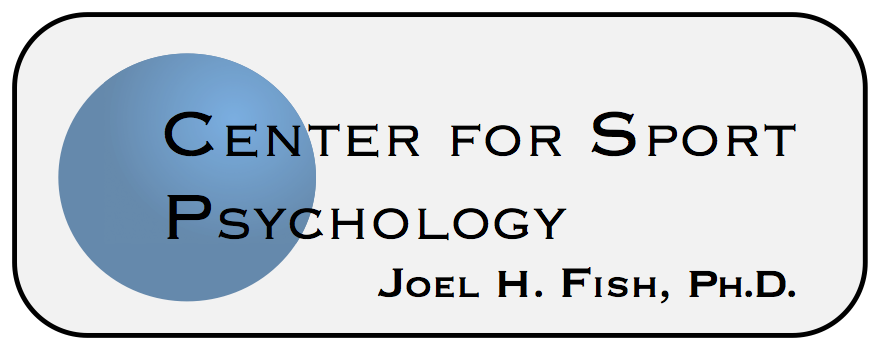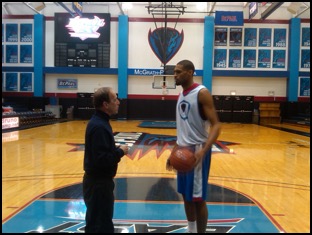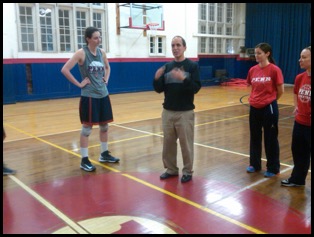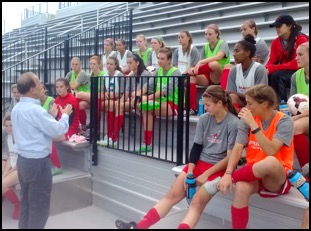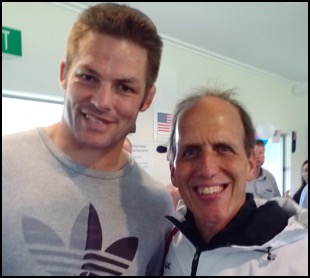Student-Athlete Presentations
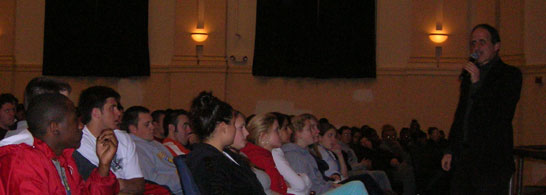
The following Student-Athlete Presentations are currently offered
by the Center for Sport Psychology.
Psychology of Winning On
and Off the Playing Field
There are common mental skills necessary to be successful on the athletic field, in the classroom, and in one's personal life off of the field. This presentation focuses on practical skills related to improving self confidence, focus, communication, good judgment, positive decision making, and teamwork, both on and off the playing field.
Athletes and Mental Health Issues
Athletes experience the same feelings and thoughts as non-athletes.
Learn the signs and symptoms of athletes who are experiencing anxiety, stress, depression, relationship issues and other mental health issues. Also learn ways to communicate with teammates and coaches in order to best address athlete mental health issues.
Gaining the Mental Edge
Explanation of the STAR System: Self-Confidence, Temper Control, Positive Attitude, Respect. Demonstration of sport and academic applications
Skills To Being An Effective Team Leader
There is evidence that team leaders rate their athletic experience as less enjoyable than non-team leaders. The key to improve team leader effectiveness is to teach them the skills necessary to play this important role. This presentation, in a highly interactive way, identifies key issues for team leaders and teaches skills in the areas of conflict resolution with teammates, communicating with coaches, and motivating different personality types.
Mental Toughness: How to Get It
Clutch performance … How much is inborn and how much is learned?
Mental skills can be taught to increase a person’s ability to perform best in pressure situations. Learn about focusing, visualization, relaxation and mental preparation and how they can help with the "mental part of the game."
Reducing Risky Student-Athlete Behavior
Being a college athlete is not all fun and games. Innovative strategies and programming ideas will be offered to help respond to the unique pressures on student-athletes, including: the freshmen experience, gender issues, substance abuse, eating disorders, gambling, sexual misconduct and relationship violence. In addition, learn to identify positive methods for stress management, celebration, communication, and teamwork.
Embracing Diversity and Respecting Individual Diversity
This presentation helps individuals to identify their attitudes about themselves and others, and offers ways to respect individual differences as well as to work better together.
Who Is Today's Student-Athlete?
"Why can’t they be more like we were?" Student-athletes today are different than they were 10, 20, 30 and 40 years ago. We can either be angry with today's student-athletes or learn to work better with them. Learn the latest information on male and female student-athlete’s attitudes about winning, losing, success, failure, competition, and off-the-field behavior choices. In addition, learn the strategies to more effectively teach and communicate with today’s student-athletes.
Overcoming the Jock Stereotype
A jock doesn't need to be a jerk. Identifying some negative attitudes about jocks and learning how to create a healthy image of the student athlete.
The Internet and Today's Student Athlete
The internet is a wonderful tool for student athletes to connect with the wider world. On the other hand, there are does and don't that student athletes should be aware of in terms of Facebook, MySpace, and other ways that they use the internet. This presentation gives up to date information for students athletes on how to use the internet to their advantage, and not to their disadvantage.
Mental Skills for Peak Performance
Performance enhancement techniques such as relaxation, focusing, concentration, positive thinking, and visualization will be explained and demonstrated.
Unique Pressures on Student Athletes
How to cope with the unique pressures of time management, the STAR system, parental pressures, coaching conflicts, the freshman experience, and being a role model.
Hazing & Initiations
Is it a good-natured joke? Or abuse? Is it a continuation of tradition? Or is it a criminal act? There is evidence that hazing and initiations remain a significant problem on many college campuses. This presentation will help define where tradition stops and abuse begins. In addition, learn effective programming strategies to reduce harmful rituals as well as develop more constructive teambuilding traditions.
Sexuality & Today’s Athletes
There has been an increase in incidents on college campuses related to student-athletes and sexual misconduct. This presentation will help to identify the reasons for sexually inappropriate behavior as well as provide a model to educate student-athletes on healthy sexuality and relationships.
The Psychology of Injury and Rehabilitation
It is clear that rehabilitation from injury is both mental and physical. An explanation of how to better understand and help the mental aspects of injury and rehabilitation.
Sportsmanship & Ethical Behavior
There is more cheating and poor sportsmanship in sports today than ever before, from youth sports to the Olympic and professional ranks. This presentation will identify the reasons for the lack of sportsmanship and ethical behavior in sports today. In addition, specific ways will be offered to promote fair play, positive sportsmanship, healthy competition, and ethical behavior in college athletics.
Teambuilding & Diversity
Ways to motivate different personality types will be explored. Symptoms of competitive stress, motivating the difficult athlete, and ways to improve team chemistry will be discussed. Was to respect individual differences in order to build team work will also be identified.
Women’s Issues in Sport
Women athletes often have special issues related to: sports and femininity, eating and nutrition, and competitive achievement. An examination of how to help women feel more comfortable in integrating sports into a healthy lifestyle.
More Presentations


